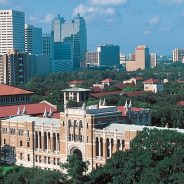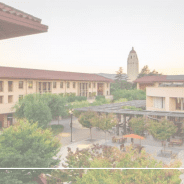Search results for Where Should I Work:
Rice University’s Jones Graduate School of Business Q&A with Assistant Director of Recruiting Kalyn Speck
Kalyn Speck, the Assistant Director of Recruiting at the Rice University Jones Graduate School of Business, recently sat down with MetroMBA to share insight into the Professional MBA Program. Kalyn works with prospective candidates for the MBA programs as well as the dual-degree programs at Rice.
MetroMBA: How does this program differentiate from other offerings at your school and other programs in the GME space?
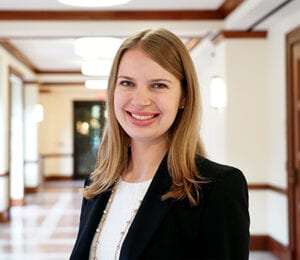
Kalyn Speck: The Professional MBA program is our in-person MBA option for working professionals. Rice Business offers an evening schedule and an alternating weekend schedule, so students can find a program that aligns with their work and family commitments. Our students can choose from over 100 electives and numerous experiential learning opportunities to customize the program to meet their specific career goals. Experiential opportunities include a Global Field Experience, the Wright Fund, the Athena Group (our student-run marketing agency), and the Rice Business Board Fellows — just to name a few. Classes are held on campus, so our Professional MBA students have access to everything Rice University has to offer including the Fondren Library, the Gibbs Recreation and Wellness Center, The Doerr Institute for New Leaders, sporting and arts events, etc. The schedule and class profile for our Professional MBA differentiates the program, but it is important to also note the similarities. The Professional MBA awards the same Rice MBA degree, and the students have access to the same clubs & organizations, Career Development Office, and faculty as our Full-Time MBA students.
MetroMBA: What is the typical profile of a student who would benefit most from this program and what characteristics are your admissions team looking for?
Kalyn: Our Professional MBA program is filled with students who want to obtain an MBA while continuing to grow their careers by staying employed. These students could be pursuing an MBA to accelerate their careers at their current company or to pivot their careers to explore new opportunities. Students benefit the most from this program if they already have post-graduate work experience to discuss in the classroom and a desire to fully engage with the Rice Business community — even outside of the classroom. Students should understand the importance of building their professional MBA network and be ready to work closely with other students with diverse backgrounds. The admissions team is looking for students who can handle the academic rigor of our courses, contribute to the close-knit community at Rice Business, and benefit from the typical MBA career paths. Additionally, and most importantly, we want students who are excited about Rice Business!
MetroMBA: What types of financial aid are available to students?
Kalyn: Our Professional MBA applicants are automatically considered for limited merit-based scholarships when they apply to the program. We also have a Student Financial Services team that offers one-on-one consultations with admitted students to discuss their unique financial situation, the loan process, tuition payment plans, and other financial aid opportunities.
MetroMBA: How does your school assist in finding job opportunities and how does your program enhance a student’s profile as a job applicant?
Kalyn: Rice Business has a fantastic Career Development Office that exclusively supports our MBA students. This office is comprised of two teams: Career Advising and Employer Relations. Our career advisors provide career coaching to help our students prepare for the corporate recruiting process or promotion conversations. One amazing perk of our program is that alumni still have access to our career advisors. The other team in the Career Development Office focuses on developing relationships with companies. The Employer Relations team assists companies with hiring our MBA students via information sessions, coffee chats, club events, industry treks, job boards, sponsorship, etc. Students can also access additional corporate recruiting support and company engagement events by joining an MBA Professional Association. Some of the most popular Professional Associations are the Consulting Association, Finance Association, Entrepreneurship Association, Technology Association, and Rice Business Board Fellows. Our program enhances a student’s profile by developing them as leaders, creating a safe space for them to apply what they learn during experiential learning opportunities, teaching them how to properly navigate the corporate recruiting process, and customizing the curriculum to achieve their specific career goals.
MetroMBA: What is one insider tip you can provide prospective applicants about applying to this program?
Kalyn: I am always surprised by the number of applicants who don’t know about our GMAT waiver request form! We review every request submitted, so I always suggest going ahead and submitting a request even if you think you don’t qualify. You might as well see what happens! You can find the request form on our “MBA Admissions Guide page.” I also suggest applying before our final application deadline. We have a rolling admissions process, so our class could fill up before the final deadline.
Lightning Round
What is one restaurant every student must visit and why?
I can only pick one?! Houston has so many amazing restaurants… so this is the hardest question yet! I guess I would have to say Treebeards. It is a great spot for some southern, Cajun, comfort food, and it is owned by one of our MBA alums! Think gumbo, jambalaya, red beans & rice, etc. They also have a fantastic selection of desserts!
Where is the best cup of coffee on campus?
We have a beautiful new coffee shop (Audrey’s) in McNair Hall, which is home to Rice Business. However, I still walk across the street to grab coffee at the student-run coffee house in the Rice Student Center. This is my favorite spot because they have my favorite drink —- the Nutty Bee! It is a honey and hazelnut latte that you have to try if you are on campus.
What is the best ‘hidden secret’ on campus?
It has to be our graduate student bar, Valhalla! It is in the basement of the Engineering building, so it is actually a hidden secret. This bar is known for its beer specials and Viking theme.
Contact:
Name: Kalyn Speck
Title: Assistant Director of Recruiting
Email: kalyn.m.speck@rice.edu
Phone: 713.348.3732
Toll-Free: 888.844.4773
Real Humans: Rice University’s Jones Graduate School of Business, Full-Time MBA
Olaniyi Dada, Rice University’s Jones Graduate School of Business, Full-Time MBA Class of 2022
School and Program:
Hometown:
Houston, Texas
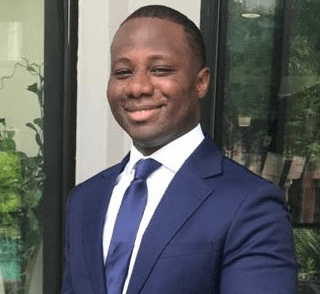
Olaniyi Dada, Full-Time MBA Class of 2022
Undergraduate Institution & Major:
Prairie View A&M University – Mechanical Engineering
Pre-MBA Work Experience:
I have worked at General Electric Oil and Gas and Baker Hughes focused on the oil field service sector. I worked in the industry for over seven years.
Why Business School? Why Now?
I needed to make a career transition from energy technical engineering to energy finance. After seven years of achieving several heights and positions within the engineering sector, I felt I had reached my highest potential within engineering. It was time to challenge myself and pivot to the energy finance sector with a career in investment banking. After several discussions with Rice Business students and alumni, I knew it was the right school for my desired transition.
Why did you pick your school/program? What factors figured most prominently into your decision of where to attend?
I picked Rice Business specifically because of the intimate class size and close-knit culture and also the school is located in Houston, which is one of the most diverse cities in the country and the fourth largest city in the United States.
What do you think is your most valuable or differentiating contribution to your graduating class?
My most valuable contribution to my graduating class is to increase and improve the importance of diversity within the finance association. My goal is to generate more interest in finance careers such as Investment Banking, Private Wealth Management, etc. within the underrepresented minority students and ensure their paths to these finance careers are successful and impactful.
Fun fact that didn’t get included on your application?
I have a strong passion for music. I started drumming at the age 10 and have played for several local gospel artists and churches. I hope to become a music producer sometime in the future.
Post-MBA Career Interest:
Do your research and be specific on exactly what you hope to gain from the MBA program and have three to five top goals you want to accomplish while you are a student. Two years come around quickly, and you want to ensure you at least achieved your main objectives.
Advice to current prospective applicants:
After completing my MBA at Rice Business, I intend to become an investment banker at Bank of America. One of my highest aspirations is to advance diversity in the energy/finance industries. Therefore, I aim to develop within the scope of one firm and industry. By contributing to diversity advancement, I’ll be on my way to reaching my career goal.
What is your initial impression of the school’s students/culture/community?
The initial observation I made when I began at Rice Business was the overwhelming aspiration shared among my classmates. I was amazed by the diversity and candidness within the Rice Business community and the social and team-building events, such as Partio, that play a big part in bringing students from different backgrounds and cultures together.
Rice University’s Jones Graduate School of Business Q&A with Director of Recruiting Joe Soto
Joe Soto, the Director of Recruiting at the Rice University Jones Graduate School of Business, recently sat down with MetroMBA to share insight into the Full-Time MBA Program. He has been with Rice Business since 2006, previously working as the associate director of recruiting in the Employer Relations team and an assistant director in the Executive MBA and Full-Time MBA programs. His current role includes managing all aspects of prospective student recruiting across all of the Rice MBA programs.
MetroMBA: How does this program differentiate from other offerings at your school and other programs in the GME space?
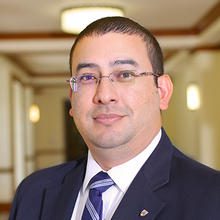
Joe Soto: The Full-Time MBA program allows students the opportunity to immerse themselves in a combination of academic, student life and career opportunities. For most of our students, this is the last opportunity to devote this amount of time and resources to enhance their career prospects.
MetroMBA: What is the typical profile of a student who would benefit most from this program and what characteristics are your admissions team looking for?
Joe Soto: A student looking to transition into a new role or industry would benefit from joining our Full-Time MBA program. This program is designed to help a student make a smooth transition across various industries, geographies and functional roles.
MetroMBA: What types of financial aid are available to students?
Joe Soto: We consider all applicants for merit-based scholarships. There is no additional application process to be considered for scholarships. We also have a Student Financial Services team that offers one-on-one consultations with admitted students to discuss their unique financial situation, the loan process, tuition payment plans, and other financial aid opportunities.
MetroMBA: How does your school assist in finding job opportunities and how does your program enhance a student’s profile as a job applicant?
Joe Soto: Rice Business has a fantastic Career Development Office that exclusively supports our MBA students. This office is actually comprised of two teams: Career Advising and Employer Relations. Our career advisors provide career coaching to help our students prepare for the corporate recruiting process or promotion conversations. One amazing perk of our program is that alumni still have access to our career advisors. The other team in the Career Development Office focuses on developing relationships with companies. The Employer Relations team assists companies with hiring our MBA students via information sessions, coffee chats, club events, industry treks, job boards, sponsorship, etc. Students can also access additional corporate recruiting support and company engagement events by joining one of many full-time MBA associations. Some of the most popular are the Consulting Association, Finance Association, Entrepreneurship Association, Technology Association and Rice Business Board Fellows. Our program enhances a student’s profile by developing them as leaders, creating a safe space for them to apply what they learn during experiential learning opportunities, teaching them how to properly navigate the corporate recruiting process, and customizing the curriculum to achieve their specific career goals.
MetroMBA: What is one insider tip you can provide prospective applicants about applying to this program?
Joe Soto: Prospective students are constantly concerned about the size of the alumni base. While a valid point, prospective students tend to forget about the importance of having a responsive alumni base. Our smaller-but-mightier alumni are actively involved in meeting with and guiding students and fellow alumni.
Lightning Round
What is one restaurant every student must visit and why?
This is a really tough question given the vast amount of great restaurants in Houston; I always recommend Crawfish and Noodles as a “can’t miss” stop. Hopefully, you visit during crawfish season but I think this restaurant is the epitome of Houston; it blends two distinct cultures into one synchronous tasteful experience.
Where is the best cup of coffee on campus?
Hands down, the best coffee is at the Student Coffee House in the Rice Memorial Center. Where else can you support the undergraduates and get a cup of coffee for $1? We also have a convenient new coffee shop, Audrey’s, centrally located in McNair Hall, which is home to Rice Business.
What is the best ‘hidden secret’ on campus?
The James Turrell Skyspace is a hidden daytime gem. The art installation is popular at sunset and sunrise but it’s a great place to relax and enjoy lunch with friends.
Contact:
Name: Joe Soto
Title: Director of Recruiting
Email: jas2@rice.edu
Phone: 713.348.5127
Toll-Free: 888.844.4773
Rice Business Equips You To Excel As 21st Century Business Leaders
Sponsored Content
Looking for a job that’s future-proof? At Rice Business, students become 21st century business leaders by making their own future, with first-rate foundational knowledge, expert technical training, practical experience — and powerful relationships based on collaboration and shared values.
A stellar career today often includes both a traditional climb up a corporate structure – and the exhilarating, high-stakes launch of a startup. Rice Business, ranked #1 in Entrepreneurship in Princeton Review and Entrepreneur Magazine and #3 in Finance by the Princeton Review, is exceptional for its blend of high-level classroom skill and practical training, said Professor Barbara Ostdiek, our senior associate dean. “Rice Business offers a balance of a traditional core curriculum focused on foundational and functional knowledge, wrapped in opportunities to apply that learning in real-time, guided practice,” she said.
An MBA Program That Listens To Students
The outcomes speak for themselves. Class of 2020 member Doug Fiefia, born in Tonga and raised in Utah, is heading to Google as a manager in customer solutions. At Rice Business, he said, one of his most powerful learning experiences has been in student leadership. In the school’s small, collaborative environment, even first-semester students are pushed to lead and shape campus groups.
“During the first year of my MBA, I realized there was no formal process for voicing student concerns and ideas,” Fiefia recalled. “I met with several stakeholder groups to try to resolve this gap and we came up with a tool called Owl Voice.” Feedback from the popular tool now goes to student officers, who respond in collaboration with staff, faculty and school leadership. “I’m grateful that I am part of an MBA program that listens to students,” Fiefia said.
Linking Business And Public Policy
Norma Torres Mendoza, also class of 2020, will be going to Ernst & Young. Torres Mendoza said she chose Rice Business for its many scholarship opportunities, its small size and its partnerships with international universities. A key element of her education, she said, was studying Business-Government relations with Professor Doug Schuler. “He teaches us that business should not and cannot work isolated from politics and the external world,” she said. “He created a bridge between the business and public policy worlds and has reinforced my passion for international mergers and acquisitions. Furthermore, he continues to teach us that all of our business actions have consequences, and as business leaders, we must have a consciousness about the positive and negative effects of our strategies.”
Bringing Houston To Rice Business Students
For all Rice Business students, interacting with Houston — the fourth largest and most diverse city in the country – is an essential part of the program. A roster of short elective courses allows our students to learn directly from the city’s top-tier business leaders on key emerging business topics. These immersive, experiential short courses cover topics such as digital disruption in financial services, block chain as a new economic infrastructure, building the data-driven firm, SQL for managers, and commercial real estate in the new economy.
“A benefit of sitting in Houston is our ability to tap phenomenal business leaders to bring their perspective and expertise to our students,” Ostdiek said. “At Rice Business, we are able to blend a small, intimate, elite university environment with this vibrant commercial center. We make a point of bringing Houston to the students.”
Rice Business fortifies this classroom experience with hands-on work. “Our students apply what they’ve learned on messy real world problems,” Ostdiek said. Second year Rice Business students can choose from a roster of specialized “lab” courses where small teams work on real problems for corporate clients or, in some cases, the students’ own new product ideas or business acquisition initiatives. Among these courses are the Wright Fund, a student-led investment fund, the Athena marketing group, and labs focused on health care operations, supply chain challenges, international energy entrepreneurship, new enterprises, and enterprise acquisition.
Prepares You For A Range Of Opportunities
Rice Business also prioritizes diversity. Both research data and practical experience agree: 21st century business leaders need to be able to interact with a range of colleagues, economies, resources and cultures. Our program includes a required Global Field Experience that includes consulting with companies and organizations in the host country. Students also have the option of studying abroad at a broad network of partner institutions.
On campus, the small student body ensures that professors know your name – and students from an array of backgrounds become lifelong colleagues. All are eligible to tap the Doerr Institute for New Leadership for free, expert coaching on professional and personal development. To Dominic Smith, class of 2020, this Rice Business network was crucial preparation for his new position at Wells Fargo as an investment banking associate.
“I am most proud of being selected to work in the Wright Fund,” Smith said. The rigorous student-led equity fund, he said, thoroughly prepared him not only for investment banking — but a range of other possible career paths. Meanwhile, outside the classroom, as Co-President of the Black Business Student Association, Smith joined his classmates in creating an innovative business case contest for local second graders. In addition to prepping and judging the students, Smith said, his team has set up a meeting for the second graders with executives from a Fortune 100 company. The topic? Their own goals as 21st century business leaders.
Contact:
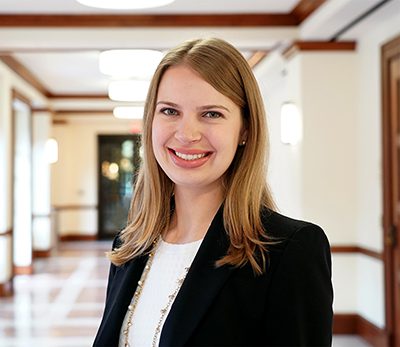
Name: Kalyn Speck
Title: Assistant Director of Recruiting, Recruiting and Admissions
Email: kms15@rice.edu
Phone: 713.348.3732
United Kingdom No GMAT or GRE Required MBA Programs

Applying to an MBA program without a GMAT score can be a tricky business. Most business schools in the U.S., Canada, and the United Kingdom require a competitive GMAT score to be considered for admissions. However, that’s not always possible for every applicant. In the United Kingdom no GMAT or GRE offerings are vast as noted below.
If you are an MBA candidate who’s not great at taking tests or earned a low GMAT score, don’t worry; you’re not out of luck. There are numerous schools and programs in the United Kingdom that will accept your MBA application without the GMAT or GRE, as long as you meet certain specific other requirements.
List of the top United Kingdom programs that don’t require a GMAT or GRE:
| School/Program | GMAT/GRE Status |
|---|---|
| Imperial Full-Time MBA | Including a GMAT or GRE score that meets or surpasses our requirement at the time of your application greatly enhances the likelihood of an invitation to interview. However, if all other components of your application are very strong, we may proceed to the interview stage without a score. In such a case, if you are successful at the interview, our offer will be conditional upon the required score being achieved prior to the programme commencing. the GMAT or GRE |
| Oxford Executive MBA | Does not require the GMAT or GRE |
London Masters of Finance | Does not require the GMAT or GRE |
| Imperial Global One Online MBA | Does not require the GMAT or GRE |
| Imperial Weekend MBA | Does not require the GMAT or GRE |
| Imperial Masters in Management | Does not require the GMAT or GRE |
| Imperial Masters in Finance | Does not require the GMAT or GRE |
| Ashbridge Executive MBA | Does not require the GMAT or GRE |
| Cass Defence MBA | Does not require the GMAT or GRE |
| Henley Executive MBA | Does not require the GMAT or GRE |
| Henley Flexible Executive MBA | Does not require the GMAT or GRE |
| Cambridge Executive MBA | Does not require the GMAT or GRE |
| London Business School Masters of Finance | Does not require the GMAT or GRE |
| Oxford Executive MBA | Does not require the GMAT or GRE |
| Warwick Distance Learning MBA | Does not require the GMAT or GRE |
Program’s Without a Test Requirement – Should I still consider it?
The short answer is yes, but it depends on how the admissions team from each program builds their cohorts. Schools can determine the quality of their class without a standardized test score. For example, programs will take work experience, undergraduate GPA, and managerial experience into account. In addition, admissions teams will find a diverse student body that is qualified to build a high-quality classroom experience. If schools do not have strong non-standardized test requirements, you should ask how they determine the quality of their class.
Is the GMAT required in the UK?
There are numerous programs offered in the United Kingdom that do not require the GMAT or GRE. The London Business School, Warwick University, and the University of Cambridge lead the charge in these offerings. Standardized tests are not the only factor to consider when applying. Your work experience has the quality to be considered as a candidate. Also, you should consider taking the test if it will enhance your application. Overall, there are high-quality United Kingdom no GMAT or GRE MBA and MS programs available to consider.
How Long Does It Take To Get an MBA?

The process of earning an MBA is an exciting and often transformational time in someone’s life—and for some people, the faster you can get through it, the better.
The benefits of earning an MBA, such as increased post-graduate salary, career advancement potentials, and development of a strong business network, remain true regardless of how long it takes to complete your degree program. Completing your degree quickly just means reaping the benefits faster, while limiting the amount of time without an income.
MBA graduates are a diverse group—not only are they rising business leaders, but they are also parents, community organizers, and working professionals. With so many different types of MBA programs available, such as Online or Accelerated MBAs, students can choose the best program for their busy life and time constraints.
How Fast Can You Earn an MBA?
The average time it takes to complete your MBA can vary depending on the school, program, and type of degree. We’ve rounded up the most important information regarding the average program length and schedule for a variety of MBA programs throughout and beyond the United States.
How Long Does it Take to Get a Full-Time MBA?
With so many options to truncate the amount of time it takes to complete an MBA, it may seem strange that someone would still choose to pursue a full-time degree. Nevertheless, there are still numerous benefits to pursuing your MBA full time. Among these benefits is the increased opportunity for full-time students to get fully involved in the goings on of their university and business school. From student organizations to case competitions to hands-on experiences, full-time students have committed their full schedule to their business education and most certainly reap the benefits when it comes to skills and network development. Furthermore, taking time off of work to pursue your degree full-time leaves you open for more opportunities- such as traveling for study abroad, business plan competitions or corporate visits- that likely wouldn’t be possible for someone working while they’re in school.
The average full-time MBA degree today typically require around 30-60 credit hours, with variation depending on the program. With the typical course load asking students to take three courses (nine credits) per semester, the average full-time MBA can be expected to be completed in two full years. Most full-time programs begin in August or September and take four semesters for students to complete their required work, earning their degree by May or June of the second year.
Since the number of credits required by a particular program can vary, some full-time MBAs may be able to be completed faster than two years. Whereas programs like the full-time MBA at NYU’s Stern School of Business takes two years and requires 60 credits, a program like the full-time MBA at McMaster University’s DeGroote School of Business can be completed in as few as 16 months.
How Long Does it Take to Get a Part-Time MBA?
A part-time MBA is the perfect option for someone who doesn’t want to put their career on hold while they earn a degree. With a flexible and often self-paced schedule, students are able to complete their degree in a time frame that works best for them, with classes typically offered at night or on the weekends.
While the benefits of a flexible schedule are enormous, one downside is that taking less courses each semester will ultimately extend the amount of time it takes to complete your degree. Typically, students pursuing their MBA part-time will earn their degree in three years, but this can vary significantly—not just depending on the program, but the person! For example, the top part-time MBA program at Northwestern University’s Kellogg School of Management can take anywhere from 1.25 to five years to complete.
YOU MAY ALSO LIKE: How Quickly Can You Earn an MBA in New York City?
What About an Accelerated MBA?
It’s right there in the name—the Accelerated MBA is all about earning a quality business education quickly and jumping right back into work. Most accelerated MBA programs can be completed in just twelve months if pursued full-time, or twenty-four months on a part-time schedule.
Of course, completing a degree in this length of time takes an impressive commitment. Unlike other programs that have winter and summer breaks between the semesters, many Accelerated MBA programs have shortened vacation periods and will require students to continue working throughout the summer.
Not every school offers a One Year or Accelerated MBA options, but those that do take these programs seriously and ensure that the same quality education received in a full-time degree program can be provided to students in just one year. Programs like the One Year MBA at Emory University’s Goizueta Business School boast impressive statistics, such as a 5:1 student to faculty ratio and a 93 percent success rate for graduates receiving employment within three months of completing their degree.
Is An Online MBA a Faster Option?
The world of Online MBAs is a diverse one with a wide array of options to choose from. Really, the only commonality between all online programs is where the classes take place—online! These programs provide for maximum flexibility where students can pursue their education from the comfort of their own homes—or wherever the world may take them.
Online MBAs come in all shapes and sizes, but typically require an average of around 30 credit hours. Depending on the university schedule, this can take up to two years to complete. At Temple University’s Fox School of Business, for example, the Online MBA program can be completed in 20 months, and includes a one week long opening residency. Some schools may also offer their part-time or Accelerated MBA programs in an online format. At the Kogod School of Business at American University, their AACSB-accredited online MBA involves 48 total credits but can be completed in just one year.
What About an Executive MBA?
The Executive MBA is a program designed for professionals with several years of work experience under the belt, who are looking for an MBA education to enrich their professional experience and open new career opportunities. Since this degree is targeted towards working professionals, it is typically structured so that students can keep working full-time, taking classes in the evenings and weekends.
On average, Executive MBA programs will take up to two years to complete, though this is typically a very part-time schedule. One of the top ranked EMBA programs in the country is the Executive MBA at Fordham University Gabelli School of Business, which can be completed in 22 months by attending class for one three-day weekend per month.
From your first day of classes to graduation, a world-class business education is typically no more than two years away. However, the flexibility of many programs put the power in the student’s hands: important factors like your schedule, finances, and the impact of taking time off of work should all factor into your decision about what type of MBA to pursue.
MBA Career Coach Advice
What are the Benefits of an MBA Career Coach?
- Identify your transferable skills when you are seeking a career transition or seeking to enter a new industry.
- Assess your career opportunities based on your personal goals.
- Polish your resume as an impartial third-party. Career coaches have experience working with hiring managers across many industries. They are also trained to be experts as resume writers and understand how organizations use resumes to find candidates.
- Provide advice on presentation and interviewing skills.
- Provide greater personal and career growth.
- Show you how to improve your leadership and interpersonal skills. In addition, they help you learn to healthily integrate your work with the rest of your life.
- Help you set measurable goals for your journey and create a process to track them.
- Motivate you to see how others view your personal skills to help you become a better professional.
- Assist in personalizing your resume, cover letters, and interviews.
- Provide access to a larger network for job opportunities.
- Navigate salary negotiations
- Motivate and teach you to gain career confidence, insight, encouragement, and inspiration.
Traits of a Great Career Coach
Regardless of where you choose to look, keep an eye out for professionals who have several years of experience, certifications, and strong client testimonials. There are many MBA career coach options, but the most important factor is making sure your relationship is the right fit. Take into account their coaching style and personality. Finding the right fit maximizes your potential to have a successful experience. It is also important to find a coach who has had actual experience in your preferred industry or career. These coaches will have larger networks within those industries and also understand the nuances of your career choice. Lastly, it is important your career coach has strong coaching experience and training. Anyone can claim to be a great career coach, but their experience is one of the most important credentials of them all. Certificates can also enhance a coaches skill set, but should not be prioritized over experience.
Difference Between a Career Coach and Career Services
MBA Career coaches are provided to students within a school’s career services department. Career services have a broader range of resources. They also provide larger-scale resources such as job postings, recruiting events, and research specialists. Career coaches work within the career services department. Some schools offer personal career coaches, while others provide coaches for a cohort of students.
For example, if you’re a student in the Full-Time MBA program at the Kelley School of Business, you will take part in their unique Me, Inc. program before you even start classes. Me, Inc. will help you better understand your skills, your interests, and the types of careers and companies that are a good fit for you. Me, Inc. shapes your personal brand, dives into career development, and understand your leadership style.
Identifying Bad Coaches
With so many benefits to hiring an MBA career coach, students also need to be aware of low-quality coaches. The industry has a wide range of quality coaches, some good, some bad. The most important factor to consider is coaches who promise a ‘one-size-fits-all-approach’ – a coaching relationship should be extremely personalized. Any coach who promises a basic working relationship will not provide the individualized personal development you should be seeking. Secondly, career coaching is a process. It takes time, energy, and commitment to be successful. Coaches who promise a quick fix to your goals or problems should raise suspicion. Lastly, make sure your financial agreement is transparent. If you are a student seeking career coaching, research how involved your coach will be and the number of students they work with. When hiring a career coach outside of your program, make sure the relationship is clear and concise.
Just How Much Does an Online MBA Cost?
You may be reading this because you are thinking about pursuing an MBA due to the impact COVID-19 on your professional life. Don’t worry, you are not alone. Graduate business schools have seen an uptick in applications since spring 2020. Many young professionals who have been furloughed or unhappy with their career trajectory are considering an MBA. Business schools are also offering their programs online due to COVID-19. Like many of your peers, you are worried about how to finance your degree during such uncertainty. We have provided information on the online MBA cost and resources to fund your degree below.
What factors determine your Online MBA Cost?
Tuition – The Largest MBA Cost to You
The majority of your MBA cost will be your tuition. Schools charge by the cost per credit. If you pursue a dual degree or add a certificate for example, this can increase your total MBA cost. There are affordable online MBA programs that cost less than $20,000, which can be enticing. However, it is important to understand that you can get what you pay for. These programs can only provide the basic courses, can have a lower virtual classroom experience, and less resources outside of your curriculum There are also well-known business schools such as the University of North Carolina or Michigan University whose programs cost well over $100,000. The tuition reflects the prestige of faculty, number of credits, alumni network, online learning experience, and career services among other factors. All applicants should research these factors to determine the best return on investment for your MBA cost.
Technology Fee
There are fees in every aspect of our lives, and business school is no different. One of the major fees that will impact your MBA cost as a student is the technology fee. This includes items such as technology platform licensing, support, and the platform’s overall quality. We are all familiar with using Zoom nowadays, but a virtual classroom setting is very complex. As you research online MBA programs, you should research the technology each program uses. Another ancillary cost can be the laptop you decide to use for the program. Schools require minimum processors, hard drive storage, high-resolution webcams, and wireless cards. This can also add to the total cost of your MBA.
Student Fees
There are also general fees that impact the cost of an online MBA. The fees are common across on-site and online MBA programs. They are included in your tuition to support student organizations and student activities. For example, this can support the career services office that helps you secure an internship or job. They can also be to support the admissions office for marketing and recruitment expenses to build high-quality student cohorts. You are not alone if you do not like the idea of student fees. However, they are a vital part of your MBA cost and help with your overall investment. We recommend that all students research the fee structure for their program to ensure it aligns with the market.
Books and Supplies
Each school is different in how they charge for books and supplies in their online MBA cost. Some programs charge this expense as part of your overall tuition, while other schools make this an additional expense to students. It is important to ask your admissions representative to estimate the book and supply fee if it is not included in the tuition. Supplies for online MBA programs can include your laptop as mentioned above. The range of your books and supplies fee can be anywhere from $250-$1,500 depending on the program.
Room, Board and Transportation
The beauty of an online MBA is that you don’t need to attend in-person classes. Some programs do require week-long immersion and networking events as part of your curriculum, which can increase your expenses. For these occasions, you would be responsible for your hotel, meal and transportation expense. Other programs do not require any in-person events on-campus, which can eliminate this whole expense. If you are looking to save as much money as possible, you need to understand that these in-person events can be vital to your professional development. Do not overlook these fees as part of your program because they can build your network. Very rarely, students will decide to relocate near or on campus to pursue their online MBA. There are benefits like being more ingrained in campus life and more opportunities to network with students from other programs, faculty, and staff. If you decide this is the right option for you, it could impact the online MBA cost.
Online MBA Cost Summary
Choosing an online MBA is a very important decision and commitment. Researching each program’s tuition cost is the most important factor to consider since it will be the largest expense for your online MBA cost. Students should also research the technology each program uses and the fees associated to ensure their learning experience is paramount. All other fees in your total online MBA cost should be considered, but they will be a very small percentage of your overall investment.
Rady School of Management Q&A with Dean Lisa Ordóñez
Lisa Ordóñez, the Dean at the Rady School of Management at UC San Diego, recently celebrated her first year with the university. Prior to Rady, Dean Ordóñez previously served for 25 years at the University of Arizona. Her roles included being a research faculty member and later as vice dean for over four years. MetroMBA recently sat down for an interview with Dean Ordóñez to discuss how her experience has been so far, the strong biotech and tech start-up community within San Diego and Rady, how their program differentiates itself and how they are adapting their learning amid COVID-19.
MetroMBA: You are celebrating your one-year anniversary as the Dean at the Rady School of Management. What has been your experience so far? What has surprised you the most?

Lisa Ordóñez: It’s very exciting to come in as the second-ever dean at the Rady School of Management. Bob Sullivan was the founding dean who did an incredible job to start a business school from scratch. The transition has been smooth because the Rady community has been so welcoming and supportive, including our lead donor, Ernest Rady. Since Rady is still relatively new, there are many ways that I can help prepare us for future growth.
I have spent this last year learning about the San Diego region and its history. We are the only program at a Research university to be started within the last 20 years accredited by AACSB. The Rady School of Management exists because the community asked for us. Thus, Rady is committed to the San Diego business community.
The strong biotech and tech start-up environment in San Diego is a great opportunity for our students. The students work actively on business problems, whether solving data analytic problems, or taking biotech or tech solutions to market. We teach our students how to take an idea through the process of building a business and going to market.
Biggest Surprise at Rady
Really the biggest surprise was learning about the incredible business and start-up community in San Diego. This is a very connected and supportive community with a concentration in biotech. Even with this strong support structure, it became clear during the pandemic that many small and mid-sized businesses were struggling and needed more support. At the same time, we had MBA students whose internships were being rescinded. In addition, incredible donors stepped in offering support. In response, we created the ‘Rady Coalition for Business Recovery’ to put together teams of students and faculty to help bring solutions to local businesses who needed help during the difficult time amid COVID-19.
MetroMBA: What is the one area of the Rady MBA program that you wish prospective applicants knew more about?
LO: Learning by Doing. It is the key way to learn and is not a new concept. A quote based on ancient Chinese thinkers sums up the value of learning by doing: ‘tell me and I’ll forget, show me and I might remember, engage me and I’ll learn.’ That engagement and learning by doing is the foundation of the Rady student experience. Our ‘Lab to Market’ project allows MBA students and select engineering students to take a concept and go through the process of creating businesses. In addition, our masters students in finance, business analytics, and public accountancy all have to work on a real business project and use the skills learned in the program. They are doing this with the best research minds in academia. We have incredible business faculty who are creating the cutting-edge tools in business management; so, our students are learning from the people who create those tools.
MetroMBA: What sets the Rady School of Management graduate management education offerings apart from those of other schools your applicants are considering? Basically, if someone is looking to go to business school, why should they choose Rady?
LO: Our focus on innovation and class size are our differentiating factors. Students receive individualized experiences with our faculty, including personal mentoring and a dedicated team to support them. Students are immersed in an environment that promotes innovation and entrepreneurship in the classroom and projects. They will be working with students who already have masters, PhD, and MD degrees. We also have many veterans from the military who bring leadership experience. Thus, they are working with an interesting array of classmates who bring a ton of experience. Together, these incredible students will work closely with our research faculty to apply the knowledge they are learning in the classroom.
MetroMBA: What are the advantages to going to business school in California and more specifically, San Diego? How does the Rady School of Management prepare students specifically for careers locally, regionally and globally?
LO: What we teach our students can help them go anywhere. We have a large international contingent, so we are training people who go back to home countries, while many remain in the U.S. as well. We are training our students to have cutting edge tools to thrive in San Diego, which is one of the largest areas for biotech start-ups. We place these students to companies right here in town and around the world.
These days with the pandemic, you need an educational experience that allows you to adapt to a quickly changing environment. In addition, all of our programs are mathematically and analytically focused so the students learn strong techniques that are cutting edge in the business world.
Another advantage for students is that our career services start before you even get on campus. We provide resources including resume workshops, individual interview training, and virtual conferences for meeting companies and securing internships. It is something we are working on from day one. I say this to all of our incoming students, “your job is to get a job.” Thus, we provide our students with events such as meeting firms or bringing industry leaders speakers to us (now virtually) to prepare them for the job market.
Corporate Partners at Rady
When it comes to Rady’s corporate partners, Qualcomm is the largest employer in the region where many of our students secure jobs upon graduation. There are other large companies like Illumina and Lytics which we have a strong job placement pipeline as well. We also have several biotech and tech start-ups in which our students take leadership roles. Lastly, we are launching our corporate partnership to market our MBA programs and our new weekend MS in Business Analytics program for working professionals. We are in the process of developing agreements with companies in which we will offer fellowships for their employees and the companies will recruit and provide tuition remission to attend programs within the Rady School of Management.
MetroMBA: What is the one upcoming development or change at the Rady School of Management that you are most excited about and why?
LO: One thing that we did this year that helped us during the pandemic is that we reconsidered our admissions process for the MBA, which required the GMAT/GRE. This year and next, we are waiving the GMAT/GRE for most applicants in the Evening and Weekend MBA programs, which helped us double and triple enrollment numbers for our programs this fall. In the Fall of 2021, we will launch our new FlexWeekend Business Analytics program targeted for working professionals. This was just a nascent area of study during the time they received their degrees, but now students can come back and get trained in how to harness data to make better business decisions.
MetroMBA: Everyone has been affected by the uncertainty of Covid-19 and how it will impact their decision-making whether they will attend business school, delay their decision or even what program they will consider. What has the University done to ensure students are confident in their investment?
LO: The one thing we did since we knew COVID-19 would lead to lower percentage of acceptances was to drastically increase the number of students we admitted. We knew there would be those who chose to delay their education and defer until Fall 2021. As the pandemic continued, several students requested deferrals for next year, which we liberally granted to meet the needs of these students. Even with these deferrals, we have the good problem of having a much larger number of students join us this fall than ever. Luckily, we had a deep pool of quality applicants so we did not have to lower our standards to have the highest enrollments to date. Due to the deferrals, we already have a great start for Fall 2021 admissions.
In terms of connecting with students during the summer, our goal was to make sure they felt part of Rady before they joined us by hosting webinars, training, and townhall sessions. Most of our enrolled international master’s students did not receive visas to join us this fall due to closures in emigration offices. We decided to offer 8 p.m. PST classes in our MS in Business Analytics and MS in Finance to allow students in Asia to attend classes via Zoom synchronously so they are able to actively participate, rather than watch a recorded lecture.
Adapting to the New Remote Learning
We have identified Vincent Nijs, a marketing faculty member to be our tech liaison. He and our IT group have trained our faculty to integrate best practices for remote teaching, efficiently use breakout rooms, polling and other types of techniques to keep students engaged during class.
We have found that we are getting more participation than in some of our face-to-face classes. The students can write notes in the Zoom chat or meet in breakout rooms to solve problems or discuss the course concepts. They cannot hide in the back of class. In reality, remote teaching is not lower quality instruction, but simply a different type of instruction which is helping our students adapt to the ever-changing workplace.
Stanford GSB Executive Education Pivots Programming Amid COVID-19
MetroMBA recently interviewed Sarah Soule, Senior Associate Dean for Academic Affairs, and Ryann Price, Director at the Stanford Executive Program, of Stanford GSB to discuss the school’s pivot in program offerings as COVID-19 impacts higher education. Sarah and Ryann also talk about the future of Stanford GSB Executive Education post-pandemic and provide in-depth information on specific programs they are offering for 2020-2021.

Can you provide a brief overview of the new Stanford GSB Executive programs? Talk a little about why Stanford GSB decided to pivot their program offerings and the process you took to design the courses.
Sarah: The Stanford GSB Executive program just launched their on-demand online classes in the beginning of September. These courses allow participants same-day access to experiential research-based content that was designed by the Stanford GSB faculty. The program was developed so that leaders can immerse themselves in topics that are relevant right now and are business challenges they face currently, so students can have real impact on their organizations. Additionally, the Stanford GSB on-demand online classes are available for you to self-pace yourself as you go through the program.
The process the Stanford GSB Executive program took to decide these topics was to focus on the challenges we are facing right now. The first topic, given the climate of the country and the world, is leveraging diversity and inclusion for organizational excellence because of course there has been so much attention on the reaction to the killing of George Floyd, and the protests in the U.S. and other places on what organizations can do to improve upon diversity and inclusion. Another topic is focused on disrupting your business, thinking about the climate we are in right now with the pandemic and what economic forces are doing to business right now. The main takeaway is how leaders respond to these challenges and their ability to be agile to that response.
The next learning topic is focused on sharpening communication skills. The Stanford GSB Executive Program discovered that leaders right now need better abilities to communicate both internally and externally. For example, Zoom has become a new mode of business for us all, so finding effective ways to communicate using this platform is vital. In addition, thinking about the importance of communicating to disperse workforces and how to effectively do that. Finally, the last course is our Paths to Power, a class that has been very popular in our MBA program for many years and the Stanford GSB Executive program thought it was great opportunity to roll out during our pivot.
There is no application fee for this program; however, each course is $1,500 and you receive a certification on completion. It is on-demand and online where you sign up and are immediately put into the class. You have 60 days to access the program, but you can do this at your own pace. The courses have assignments, which they have designed to be experiential and engaging with feedback from professors. The plan is to roll out more courses as the program continues.
Can you talk more about the newly launched Stanford Business Leadership Series and the adjustment to the Stanford Ignite program?
Sarah: The Stanford Business Leadership series was launched this summer and exceeded expectations in terms of the quality and quantity of the number of participants. The program gives students the ability to purchase a subscription, which provides access to over 50 faculty members. We are about to launch the second version in October 2020. Like the on-demand classes, the Stanford GSB Executive program decided to be really particular about the kind of needs leaders have right now.
There are a variety of modules available to students, who can choose to do all of them or just do one. The modules include Leading in the COVID Era, Leading Diversity and Inclusion, Leading Strategy on Development through Execution, and Lead Transformation: 5 Mega Trends Every Leader Needs to Know.
The Stanford Leadership Program is different than the online on-demand learning; these programs cost $2,500 for a 2-week module or a 10-week module for $7,500 all-access pass (though prices may adjust). The summer program had their first topic, “Leading in a Turbulent World,” thinking a lot about where we are as leaders during the pandemic and economic crisis. They also had a module on strategic leadership, another on innovation and creativity, another about entrepreneurial mindsets, and demystifying the numbers.
The summer Stanford Business Leadership series sought to implement what they are known for as a business program and Executive Education, but add a layer about what is going on in the world. Now in the fall, we want to focus on what is going on in the world and how Stanford can leverage how to speak best to COVID, diversity and inclusion and a distressed workforce. There is no prep work for the program since it is all lecture and Q&A, compared to the other program where there are assignments. Upon completion of the program, all students receive a certificate.
Another program we launched that has been incredibly successful, is that we pivoted a number of programs we planned in-face to online experiences. The Stanford Ignite entrepreneurial program, which is a multi-week program, we put it online for students who had planned to attend on-campus. Students were with us on Zoom throughout the day.
Ryann: Other learning opportunities at the Stanford GSB Executive Program that transitioned from in-face to online experiences include: Innovative Technology Program, Program for Growing Companies, Harnessing AI and Big Data. With these we experimented over a number of weeks, and students would attend a number of hours in the morning then work their jobs. We learned how long they should spread content out. For example, can students handle eight hours of learning on Zoom? We found that people need connection and people need learning. Leaders are making up so much as they go through their day to day, they need engagement, connection and learning.
Learn more about the Stanford Executive Education Offerings.
What was the process you went through to decide on the pivot?
Sarah: Ryann was involved with the pivot and deciding on how to provide these programs.
We did what we teach: Design thinking, customer empathy, really finding out what problems people have and how they are experiencing them, to understand through their point of view what their problems and needs are. We spent a lot of time talking to students in their program and who were disappointed they weren’t able to travel and offer face to face program. We spoke with custom clients to find out the challenges they face right now versus what they thought they would be facing. We used that information on how to respond to the here and now and meet people where they were at the moment with the current challenges. It was an all hands-on deck between administration and faculty to get this implemented and launched.
Ryann: One highlight about the process – we were listening and testing out what we heard from leaders about staying connected and they wanted a better sense of hope and greater control of what was happening in the world. We tested how that would be received through a ‘7 Day Challenge,’ a free series of content based off of creativity from faculty members. That series was very popular and people felt like they could engage with a sense of purpose. We felt they were given tools at this time of need.
We used data via partnership with our coaching provider through our executive program. We had access to larger data sets about what students are talking about with their coaches, not at an individual level, but at a theme level. So, they were able to see that struggling with uncertainty was a challenge and we also found people wanted help with communication. Also, we heard from users that flexibility was important to them. All of these programs offer a higher degree of flexibility. People who typically have a 9 to 5 job now have greater access to these programs and manage their work/life balance.
What is a typical participant profile for the Stanford GSB Executive Education programs?
Sarah: The anti-racism module that is about to be released is for anyone who is curious or wants to engage in material.
The Stanford Business Leadership program tends to target upper level leaders in companies and nonprofits with some degree of leadership or managerial experience.
We also plan to continue our LEAD program, which is a one-year certificate program. With this program, the spring intake had the largest cohort with just under 300 participants. There are over 520 students in our new fall intake. This provides something that people need. This participant set is typically (see attachment). Many already have advanced degrees, but they are people who are at a career pivot, new role in their organization, leadership training, and/or usually managing some people. Some already had an MBA, but wanted more leadership training or a brush up on the core classes they provide.
Our Stanford Ignite program ran one cohort for post-9/11 veterans, which was very specific, but we care deeply about this demographic as a school. We also hosted another program for aspiring entrepreneurs. What we have been doing with the pivot is serving more and different people than we normally would in face to face programs. We are offering more access with these online programs that offer more flexibility.
Ryann: These online programs are designed to remove the barrier for those who want to attend our on-campus programs – it usually is a geography barrier, but also they may be a founder of a company, but could not commit to a face to face experience. We hope to understand that user profile so we can continue to develop programs that are more flexible and accessible.
Do you view the Stanford GSB Executive Education programs as a complement or alternative to an MBA?
Sarah: The challenges that we have been discussing would most definitely benefit an MBA. The on-demand classes for 60 days can absolutely be taken with an MBA and are viewed as a complement. There might be students who want to see more diversity and inclusion in their curriculum. You might be in an MBA program that does not cover topics such as inclusion and diversity, but you would like to learn more. Taking the online on demand class is set up so you can take this as a complement and earn your certificate strengthening your professional profile.
The LEAD program is one year and based on the time commitment, so it wouldn’t be a complement to a current MBA; however, many students believed it would be a great option as a ‘third year’ to their MBA because they learn key skills and expand their network.
Ryann: Also, the Stanford Ignite program has multiple cohorts per year and the part-time program is designed for driving innovation or for entrepreneurship. The program is committed to exploring what it would be like as an entrepreneur or if they stay with their current role and want to transition to the team driving innovation via the product or process side.
What is the admissions process for the Stanford Executive Education Programs?
Ryann: There are programs that do not have an application. We encourage applicants to select the right application for you. Stanford also has learning advisors during all business hours to answer questions to help learners select the right program. The first step is if you are not sure, reach out to them.
If there is an application for a program, it sounds a little cliché, but we recommend leading with yourself. We want to bring together a live dynamic learning experience for their peers. We want to find people when we put the cohort of individuals together, we want to create a dynamic class. We are hoping through the admissions process to provide the right opportunity for them. We want to create an experience where faculty and students are learning together.
Sarah: LEAD is a long certificate program. We have an application process with an essay and two video questions. We look at them really seriously and take into consideration the whole application. We want to make sure you are a change agent and how you can contribute in the classroom.
Will the impact of COVD-19 make these learning opportunities the norm for future leaners?
Sarah: It is exciting because this is a new opportunity and we do not know when it will be safe again to be on-campus and travel. Since we had to make this pivot, it allows more flexibility. It will provide more blended experiences – such as bringing people to campus for two days for an intense experiential learning program. It will also complement their current offerings and potentially be an additional opportunity for students moving forward. It will allow us to change the way they think about what it is we offer in terms of educational opportunities for leaders.
Ryann: We are asking ourselves this question every day and using a discovery process – always iterating and learning and considering other options. Faculty are creating ideas and staff are articulating how they can logistically make them possible. It is a challenging time because it is not safe to be on campus, but it allows them to be free to explore what could be possible. We are proud that we came together to find innovative products and serve their students’ needs.
Master of Accounting
The Ohio State Fisher College of Business Master of Accounting Program Structure
As one of the first STEM accounting programs in the U.S., Ohio State’s Master of Accounting (MAcc) graduate program is a national leader. Fisher delivers personalized, hands-on experiences to prepare you for a career in accounting. Students are able to complete their degree in just nine months. After completing the four core courses, you can arrange your electives over two semesters to fulfill the required 31 credit hours. With
fewer than 90 students in the program, you’ll collaborate and connect with your peers and interact directly with faculty members who know you by name.
Curriculum
The MAcc program is genuinely a flexible degree. Fisher encourages you to think broadly about accounting, including its role in organizations and society. Students are able to design their graduate degree to develop their interests, skillset, and potential for achieving your career goals. Fisher is also one of the few accounting programs with data and analytics coursework to prepare you for a world driven by data.
CORE COURSES (10 credit hours)
The MAcc core curriculum is designed to build a solid accounting foundation while developing your technical, critical thinking, and communication skills. It supports your elective choices, and ensures you have the required experience to be successful in the classroom and in your future career. The innovative STEM-designated MAcc curriculum is a national leader and is supported by an academic advisor and career coach that help you reach your career goals.
ELECTIVE COURSES
Elective courses allow you to explore a vast array of interests while broadening your understanding of the role accounting plays in organizations and the marketplace. You can choose from accounting-based electives as well as dozens of other robust options offered throughout The Ohio State University. The course list below illustrate a sample of the wide range of focuses that are offered within the available electives.
As a Fisher MAcc student, you are not required to have a specific declared “area.” The information below simply provides you with an idea of the electives available to you, categorized by interest area.
DATA AND ANALYTICS INNOVATION
Modern-day accountants increasingly deal with large volumes of information arriving in big data sets. They need the skills to be able to process these data sets, formulate the appropriate questions to ask the data, design the right test, interpret the results and present their conclusions. In the MAcc Program we updated the curriculum, in partnership with KPMG, to expose our students to large data problems, and provide them with the necessary tools that will allow them to solve these problems. Learn more >.
CAREERS AND PROGRAM PLANNING
Because of the wide range of accounting career paths, we encourage a portfolio approach to your course experience. Explore electives in areas such as auditing, finance, or operations management, and take advantage of dozens of other options available through Ohio State. It’s beneficial for all types of students who come to us: undergrad accounting majors, students from other disciplines, and working professionals who seek deeper insights for career success.
Class Profile
The most recent Ohio State’s Master of Accounting at Fisher class had around 90 students. The G.P.A range was between 3.4-3.9, with 85% of students having less than one year of work experience. 22% of the class consisted of international students, with the average age of students being 23 years old. The average GMAT score for students was
Tuition, Scholarships, and Financial Aid
The estimated tuition rate for the Ohio State’s Master of Accounting graduate program is $32,833 for residents of Ohio and $57,599 for non-residents and international students. The cost covers the following: General Tuition & Instruction, Student Activity Fee, Student Union Fee, Recreation Fee, Learning-Technology Fee, COTA Bus Fee.
The MAcc Admissions Committee awards merit-based MAcc scholarships to successful applicants on a competitive basis. Scholarships may range from $3,000 up to $15,000. Graduate Assistant appointments are for 10 hours per week, provide 50% tuition waiver, and a monthly stipend. All admitted applicants are automatically considered for GA appointments; an application is not required. Recipients are notified prior to their admissions response deadlines. Fisher College of Business nominates its strongest MAcc degree candidates for The Ohio State University’s fellowship programs. These fellowships provide a full waiver of tuition and general fees, plus a monthly stipend. The application deadlines for fellowship nominations are much earlier than all other application deadlines – apply early if you wish to be considered for nomination. Federal loan programs provide a primary source of financial aid to domestic graduate business students. To be eligible to apply for federal financial aid, a student must be admitted to the MAcc program, be a U.S. citizen or permanent resident, be enrolled full-time for each semester that aid is received, and be in good scholastic standing (3.0 or better grade point average).
Admissions
Applicants to the MAcc degree program must have completed (or will complete prior to enrollment) a baccalaureate degree from an accredited college or university. Applicants’ academic records should demonstrate an ability to pursue graduate studies in the accounting field, including completion of pre-requisite requirements.
– Academic Transcripts: One of the requirements for admission to Fisher is the completion of a four-year bachelor’s degree or its equivalent prior to enrollment if admitted. The Ohio State University generally does not recognize a three-year bachelor’s degree to be equivalent to a four-year bachelor’s degree. You must provide official transcripts from each undergraduate (and graduate, if applicable) institution where you earned academic credit. Each transcript should include all coursework previously completed, as well as coursework currently in progress. You must provide official transcripts for each institution if credits were earned abroad or were transferred between universities.
– Prerequisites: Admission to the Fisher MAcc program is open to graduates with the equivalent of an accredited four-year U.S. bachelor’s degree in virtually all areas of study: liberal arts, business, engineering, and other. Students must complete five prerequisite accounting courses to complete the MAcc program. If you have not completed all five in your prior coursework, Fisher offers options to complete a portion of these courses through our Pre-Macc and MAcc programs. You must have completed Principles of Financial Accounting and Principles of Managerial Accounting in order to be reviewed for admission to the MAcc program.
– Test Scores: All applicants are required to take the Graduate Management Admission Test (GMAT) or Graduate Record Exam (GRE). There is NO minimum GMAT or a GRE required to enter our program. GMAT and a GRE scores are valid for five years from the date the test was taken.
– Resume: Resumes can be longer than one page to account for additional details about your school and work history, accomplishments, awards, community or professional organizations or other information that would be relevant for the Admissions Committee.
– Essay Topics: Why do you wish to earn a Master of Accounting (MAcc) degree? Why do you wish to earn an MAcc from The Fisher College of Business? How will the Fisher MAcc program assist you in achieving your immediate career goals?
– Letters of Recommendation: You are required to submit at least two (2) letters of recommendation that can speak to your potential to be successful in the program. You will have the opportunity to ask your references to submit either electronic or paper letters of reference on your behalf when you submit your online application.
– Video Interview: Each applicant is required to complete an online assessment comprised of recorded video questions. Since live interviews are on a need-basis, the video interview is a way for us to virtually meet you and get a sense of your personality and potential beyond what you’ve included in your application.
– Application Fee: The non-refundable application fee is $60 (U.S. Dollars) for United States citizens, permanent residents, or asylees, and $70 (U.S. Dollars) for international students.
Ohio State’s Master of Accounting 2020-2021 Application Deadlines
November 13, 2020: University Fellowship and Graduate Enrichment Fellowship deadline: Fellowship-eligible* applicants must submit their applications by this deadline to be considered for nomination in the Graduate School competition.
January 8, 2021: Financial aid priority deadline
March 19, 2021: Final application deadline for international students
May 14, 2021: Final application deadline for domestic students
The Top Online MBA Programs
Covid-19 has dramatically impacted MBA programs in 2020 especially the educational delivery for current students. If you are considering an MBA right now, it is important to know that many of the in-person programs have transitioned to either a fully virtual learning environment or a hybrid learning environment. As the uncertainty surrounding COVID-19’s impact on higher education continues, there is no guarantee that these programs will move back to their traditional in-person format. The 2020 Top 5 Online MBA Programs in the U.S. should be considered for applicants.
As you review your MBA options, it is clear that five U.S. online MBA programs stand out above the rest of the uber-competitive market. According to 2020 rankings published by U.S. News & World Report and The Princeton Review, those programs are Kelley Direct Online, MBA@UNC, the University of Florida Online MBA, the USC Marshall Online MBA, and the Tepper School of Business Online MBA.
Why Choose a 2020 Top 5 Online MBA Programs in the U.S.
- Online programs excel at delivering a high-quality virtual education: The top online programs are already accustomed to providing virtual learning, career services and resources. If you are considering an in-person program, keep in mind these programs may struggle with the new virtual format. You have to consider that you might not receive the same value from those programs that you would expect for the original online MBA programs.
- Ultimate Flexibility: Fully online programs offer the most flexibility for working individuals and families. Also, if you were to attend an in-person program or even a hybrid format, you may have to change your work/life balance if classes were to ultimately return to in-person classroom learning. Keeping COVID-19 in mind, you also eliminate traveling or being in a classroom setting which may increase your risk of contracting the disease.
- Better prepare for the virtual workplace: It won’t be a surprise if companies provide employees with greater workplace flexibility in the future due to COVID-19. Companies are finding that with the right tools in place, employees can function at the same capacity virtually. An online MBA can help develop your virtual communication, leadership, and team-building skills as you complete your program.
Executive MBA
Cornell Johnson Executive MBA Americas Program Structure
The Broad Executive MBA Program offers two formats: Traditional and Flex. Traditional EMBA classes meet on-campus every other Friday evening (6 p.m.-10 p.m.) and all-day Saturday (8 a.m.-5 p.m.) The Flex EMBA is a hybrid format where students meet on-campus one weekend per month and complete the balance of their courses online on their own time.
Curriculum and Experience
The 45-credit-hour Master of Business Administration (MBA) includes approximately 30 Executive MBA courses. The rigorous curriculum is designed to sharpen your business expertise and give you a competitive edge in your career. Throughout dynamic executive MBA courses, you’ll obtain the essential business knowledge, real-world skills, and insights you need to excel in the workplace and contribute to your company’s bottom line.
The Broad Executive MBA’s diverse set of courses focus on a wide range of subject matters, from strategy, leadership and management, to marketing, accounting, finance and supply chain management. Courses on information systems, business law and global perspectives are also incorporated into the comprehensive business curriculum.
Class Profile
The Executive MBA Americas class at Broad features 118 students with an average age of 35. The class is made up of 72% male and 38% female. The class is made up of 19% international and minority students. Students in the traditional EMBA have an average of 5 years work experience, while the Flex EMBA have and average of 3 years of work experience.
Tuition, Scholarships, and Financial Aid
The current tuition for the Michigan State University Broad Executive MBA is $85,000. The program offers a no-hassle, no-surprises, inclusive tuition package that include all tuition required course materials, hotel accommodations for orientation and residencies, and meals while on campus. Tuition will be established by the MSU’s Board of Trustees in June. Please visit the schools official website for up-to-date information.
The following is required in order to apply:
1.) Attend a Program Preview (virtually or in-person)
2.) Request transcripts from all previous college/university coursework. Applicants with degrees from non-U.S. institutions: please arrange for ONE official/certified/attested university or professional school records of subjects and mark sheets, transcripts, diplomas, and/or degree certificates to be sent to the address noted below from the principal or registrar of each school you have attended, or by the Ministry of Education in your country in a sealed envelope. The names of all certificates, diplomas, degree(s) earned, and dates received should be noted. Photocopies or notarized copies are not acceptable. Official translations must be furnished when originals are not in English. You must provide official transcripts. This process could take several months, so plan accordingly.
Send transcripts directly to:
Sarah Ellis | Admissions & Academic Services Coordinator
MSU Broad Executive MBA
The James B. Henry Center for Executive Development
3535 Forest Road, Suite A180, Lansing, MI 48910-3831
sellis@broad.msu.edu
3.) Identify, notify and enter two professional recommenders. These individuals will be automatically notified to provide their recommendations through a simple online form.
4.) Update and upload your professional resume.
5.) Complete the two online essays.
6.) Contact your campus of choice to schedule an interview:
For Lansing and Flex: 517-355-7603
For Troy: 248-879-2725
A GMAT or GRE score is not required. While quantitative ability is a necessary skill, the Broad Executive MBA seeks evidence of each candidate’s ability through a variety of means such as previous course work, professional work experience, professional certifications, etc. The Broad College Executive MBA is designed for working professionals. To be accepted into the program, quality candidates must have 3+ years of significant work experience for the flex format and 5+ years for the traditional format.
Application Deadlines for the Michigan State Broad Executive MBA
Round 1: December 1, 2020
Round 2: February 1, 2021
Round 3: April 1, 2021
Round 4: May 17, 2021
Round 5: June 14, 2021 (Domestic Applicants only)
The Impact of Covid-19 on MBA Admissions: What You Need to Know as an Applicant
The Impact of COVID-19 on MBA Admissions
Due to the COVID-19 pandemic, MBA applicants are facing a unique admissions season for 2020-2021. A ‘typical’ admission season would provide numerous opportunities to meet with school representatives in person. Campus tour guides would be warm and welcoming, showing off brand new campus improvements and escorting applicants to classrooms for lively discussions. Even the GRE or GMAT would be better—marking answers in the controlled environments of test-taking centers. However, the impact of COVID-19 on MBA admissions is impacting everything.
However, this year’s admissions season will look much different. As an applicant, it is important to keep this in mind and adapt to the new circumstances—a skill that will be transferrable to your post-MBA life as well. On a positive note, according to metromba.com co-founder, Eliot Ingram, “COVID19 led to some big adjustments for both business schools and applicants this past spring and summer. The good news is that applicants who apply this fall won’t start school until the fall of 2021 and schools are likely to have made great strides in restoring the traditional in person experience by then.”
To help you prepare for this unique admissions season, MetroMBA has compiled common trends among business schools, how schools are handling the impact of COVID-19 on their admissions process, and a few tips on adapting to this new experience for both schools and applicants.
Common Changes Programs are Making Due to COVID-19’s Impact on MBA Admissions

2019-2020 Deferrals and 2020-2021 Deadlines
COVID-19’s impact on admissions began earlier this year, as many schools extended their Round 3 (or later) deadlines through the late spring and early summer. Many programs held out hope that in-person, on-campus classes could resume by the fall of 2020, but the pandemic continues to keep campuses closed. For new b-school admits to the Class of 2022, the prospect of first-year classes being held virtually was not ideal. In response to this complication, many business schools offered candidates the option to defer for a year. Although data is not yet available on how this will impact future acceptance rates, keep in mind that a percentage of each school’s Class of 2023 will be deferred students.
As you enter this year’s admissions cycle, it is important to keep in mind that many schools have kept their deadlines consistent from previous years. Clear Admit, the leading independent resource for top-tier MBA applicants, has in-depth information on what round it is best to apply to business school.
Delayed Submission for GMAT/GRE and More Test Options Available
Two major changes to this year’s admissions season are the ability to submit your GMAT or GRE score later than a typical deadline. Schools have also expanded the entrance exams they accept, such as the Executive Assessment (EA), LSAT or MCAT, for admission.
So, what does that mean for an applicant?
Well, first off, it is important to prepare for the GMAT or GRE as early as possible to give yourself the best chance to score high. Your test score is only one component of the overall admissions process; however, it is a very important metric as admissions teams review your full application. The second thing to consider is what test format allows you to be the most successful. The decision to allow exams used by med school and law school applicants was made due to the continued difficulty of taking the GRE or GMAT in a test center, many of which remain closed.
At-home Version of GRE, GMAT and EA More Widely Accepted
The Educational Testing Service (ETS), which owns the GRE, and Graduate Management Admissions Council (GMAC), which owns the GMAT and EA, have adapted to the COVID-19 crisis by offering applicants an at-home version of their respective tests. For example, GMAC has decided to make its at-home online version of the GMAT exam available through the end of 2020. It’s the third time that GMAC has extended the deadline for what was initially billed as a temporary interim solution when it was launched back on April 20th when most test centers closed due to the pandemic.
Virtual Events Have Become the Norm
Even if you think you’ve been on too many Zoom meetings or watched too many virtual information sessions, get ready—it’s going to be the new norm for this year’s admissions season. The majority of schools have moved all of their events to virtual formats, including recruiting events, interviews and campus visits. We encourage applicants to attend as many virtual events as possible as they prepare their application. There are many resources available, including the Clear Admit Applicant Insight Workshop Series, which provides applicants specific information on a school’s essay topic and provides in-depth information on the student experience. The event series includes participation from the Wharton School of Business, Yale SOM, Fuqua School of Business, MIT and more. The first two events will be held on September 2nd at 12:00 EST and September 16th at 12:00 EST.
From the schools…

“At Santa Clara’s Leavey School of Business, we have pivoted quickly to online offerings. All of our events are now online and we are seeing more students attend these engaging sessions over Zoom. Prospective students are also able to connect with a current student online as well. Overall, we have seen a strong demand in most of our programs this fall and applications are up by 50%! My advice to students is to apply early and connect with the admission offices of the schools you are applying to sooner, as I believe there will be more competition for many programs in the fall of 2021.”

“At Syracuse University’s Whitman School of Management, we actually saw a major increase in MBA applicants. I think there are two main reasons for that. First, we have robust plans in place in a time of COVID-19 for additional support for students who are on campus and those who elect to follow along remotely. We were quick to communicate that support and ensure that our students continue to be safe and healthy. Our faculty have a lot of experience in online teaching and so we were able to smoothly adjust and maintain high quality instruction, regardless of modality. Second, students increasingly saw the value of a Whitman education. We inspire students for a world of accelerating change, and our curriculum and programming support just that. Our alumni and corporate partners really helped with this, too. We’re on the right track and students recognized that.”
Quick View: 5 Tips for Preparing for MBA Admissions Impacted by COVID-19
- Research deadlines and when to apply
- Prepare for virtual interviews and recruiting events
- Review test options accepted at each school
- Stay connected with top school via recruiting events and information sessions
- Relax, breathe and enjoy the journey!
Wharton 2020-2021 Full-Time MBA: Application Deadlines, Interview, and Notification Dates
We have provided applicants with a complete breakdown of the Wharton MBA 2020-2021 deadline, interview and notification dates.
Wharton 2020-2021 Full-Time MBA Application Deadlines
| Application Round | Application Deadline | Interview Invites | Final Notification |
|---|---|---|---|
| Round 1 | Sept. 15, 2020 | Oct. 28, 2020 | Dec. 16, 2020 |
| Round 2 | Jan. 5, 2021 | Feb. 11, 2021 | Mar. 25, 2021 |
| Round 3 | Mar. 31, 2021 | Apr. 15, 2021 | May. 11, 2021 |
When to Apply to the Wharton MBA
Below is an outline of the recommended timeline to apply to Wharton depending on if you are a first-time applicant, a reapplicant, or applying to a specific program.
| First-time Applicants | Wharton encourages you to apply to in Round 1 or 2. Space in the class becomes more limited for Round 3 applicants, resulting in a more competitive round. |
| Submatriculation applicants | You should apply in Round 3 so that a more complete academic record is available. |
| Reapplicants | Wharton strongly encourages you to apply during Round 1 or 2. For advice and guidelines around reapplication, see the Reapplication section in Wharton’s Application Requirements page. |
| International Student | If you need to apply for a student visa to study in the United States, Wharton recommends that you apply in Round 1 or 2. For advice and guidelines, see the International Students section in What You Need to Apply. |
| Application Round | Submit your application by … | We will notify you … |
|---|---|---|
| Round 1 | 15 September 2020 | 10 December 2020 |
| Round 2 | 06 January 2021 | 01 April 2021 |
| Round 3 | 06 April 2021 | 20 May 2021 |
Highlights of the Wharton Full-Time MBA 2021 Class
If you are researching programs and deciding on where to apply, it is important to understand where you stack up against the competition. Below are important metrics for the Wharton Full-Time MBA.
| Category | Statistics |
|---|---|
| Total Applications | 5,905 |
| Enrolled Students | 856 |
| Average GMAT/GRE | 732/324 |
| Average GPA | 3.6 |
| Average Years of Work Experience | 5 years |
| Class Split | 46% female, 30% international, 36% U.S. students of color |
MBA Checklist for the Wharton Full-Time MBA
- Background Information
- Application Fee
- Two Essays
- Transcripts (unofficial or official)
- Two Letters of Recommendation
- GMAT or GRE Score
- English Language Test Score
- Resume
Additional Resources
- To learn about other applicants applying to the Stanford Full-Time MBA, check out the Wharton MBA LiveWire via Clear Admit, the leading independent resource for top-tier MBA applicants. MBA LiveWire is a social forum for applicants to share their journey throughout the admissions process.
- The application process can be overwhelming, fortunately you can view FAQ, Essay Topic Analysis, Interview Reports and much more via Clear Admit’s Stanford in-depth school profile here.
- To research more information about program cost, financial aid and curriculum, check out the Wharton full-time MBA snapshot here.
Stanford Full-Time MBA 2020-2021: App Deadlines, Decision, and Notification Dates
If you are applying to the Stanford Full-Time MBA in 2020-2021, we have provided all the information you need as you prepare you application. Read more below.
Stanford 2020-2021 Full-Time MBA Application Deadlines
| Application Round | Application Deadline | Final Notification |
|---|---|---|
| Round 1 | Sept. 15, 2020 | Dec. 10, 2020 |
| Round 2 | Jan. 6, 2021 | Apr. 1, 2021 |
| Round 3 | Apr. 6, 2021 | May, 20, 2021 |
Additional Notes on the Stanford Full-Time MBA 2020-2021 Application Process
Your completed application, including your letters of reference and application fee payment, is due at 4:00 p.m. Pacific Time on the deadline date for the round in which you apply.
We cannot guarantee that we will review information sent to the MBA admissions office after the deadline of the round in which you apply.
2020–2021 Deadlines
| Application Round | Submit your application by … | We will notify you … |
|---|---|---|
| Round 1 | 15 September 2020 | 10 December 2020 |
| Round 2 | 06 January 2021 | 01 April 2021 |
| Round 3 | 06 April 2021 | 20 May 2021 |
Selecting an Application Round for the Stanford Full-Time MBA 2020-2021
Stanford allows applicants to apply to one of the three application rounds each year and applicants may apply only once per application year.
Stanford encourages applicants not to rush their application, however have noted there are advantages to applying in either Round 1 or Round 2, including:
- Ample time to complete recommended quantitative and/or English language coursework prior to arrival on campus.
- Access to the on-campus housing lottery including Stanford GSB Residences (Jack McDonald Hall and Schwab Residential Center).
- Additional time to complete the visa application process (Bechtel International Center).
- The opportunity to attend Admit Weekend (there is no Admit Weekend for Round 3).
Decision Notification
Stanford posts your decision to your account on the notification dates listed above for the round in which you applied. They will also send an email to the address used to create your application profile to notify you when your decision is available. Once you hear back from Stanford, please share your results on Clear Admit’s MBA Livewire.
Highlights of the Stanford Full-Time MBA 2021 Class
If you are researching programs and deciding on where to apply, it is important to understand where you stack up against the competition. Below are important metrics for the Stanford Full-Time MBA.
| Category | Statistics |
|---|---|
| Total Applications | 7,342 |
| New Students | 417 |
| Average GMAT/GRE | 734/330 |
| Average GPA | 3.7 |
| Average Years of Work Experience | 4.6 years |
| Class Split | 47% female, 27% students of color, 43% International |
MBA Checklist for the Stanford Full-Time MBA 2020-2021
- All undergraduate and graduate institutions you are attending or have attended after high school (postsecondary school)
- Academic degree(s) pursued and/or received
- Grade point average (GPA)
- Transcript of courses
- Language proficiency
- GMAT or GRE score
- One-page resume and professional work experience
- Two personal essays: 1) what matters most to you, and why? 2) Why Stanford?
- Background, Activities & Interests, and Awards & Honors sections of the application, to tell Stanford more about yourself.
- Optional short answer questions
- Two letters of recommendation
- $25 application fee
Additional Resources
- To learn about other applicants applying to the Stanford Full-Time MBA, check out the Stanford MBA LiveWire via Clear Admit, the leading independent resource for top-tier MBA applicants. MBA LiveWire is a social forum for applicants to share their journey throughout the admissions process.
- The application process can be overwhelming, fortunately you can view FAQ, Essay Topic Analysis, Interview Reports and much more via Clear Admit’s Stanford in-depth school profile here.
- To research more information about program cost, financial aid and curriculum, check out the Stanford full-time MBA snapshot here.
Stanford 2020-2021 Full-Time MBA: Application Deadlines, Decision and Notification Dates
If you are an applicant to the Stanford 2020-2021 Full-Time MBA, MetroMBA has compiled a list of resources as your prepare your admissions journey below.
Stanford 2020-2021 Full-Time MBA Application Deadlines
| Application Round | Application Deadline | Final Notification |
|---|---|---|
| Round 1 | Sept. 15, 2020 | Dec. 10, 2020 |
| Round 2 | Jan. 6, 2021 | Apr. 1, 2021 |
| Round 3 | Apr. 6, 2021 | May, 20, 2021 |
Additional Notes on the Stanford Full-Time MBA 2020-2021 Application Process
Your completed application, including your letters of reference and application fee payment, is due at 4:00 p.m. Pacific Time on the deadline date for the round in which you apply.
We cannot guarantee that we will review information sent to the MBA admissions office after the deadline of the round in which you apply.
2020–2021 Deadlines
| Application Round | Submit your application by … | We will notify you … |
|---|---|---|
| Round 1 | 15 September 2020 | 10 December 2020 |
| Round 2 | 06 January 2021 | 01 April 2021 |
| Round 3 | 06 April 2021 | 20 May 2021 |
Selecting an Application Round
Stanford allows applicants to apply to one of the three application rounds each year and applicants may apply only once per application year.
Stanford encourages applicants not to rush their application, however have noted there are advantages to applying in either Round 1 or Round 2, including:
- Ample time to complete recommended quantitative and/or English language coursework prior to arrival on campus.
- Access to the on-campus housing lottery including Stanford GSB Residences (Jack McDonald Hall and Schwab Residential Center).
- Additional time to complete the visa application process (Bechtel International Center).
- The opportunity to attend Admit Weekend (there is no Admit Weekend for Round 3).
Decision Notification
Stanford posts your decision to your account on the notification dates listed above for the round in which you applied. They will also send an email to the address used to create your application profile to notify you when your decision is available. Once you hear back from Stanford, please share your results on Clear Admit’s MBA Livewire.
Highlights of the Stanford Full-Time MBA 2021 Class
If you are researching programs and deciding on where to apply, it is important to understand where you stack up against the competition. Below are important metrics for the Stanford Full-Time MBA.
| Category | Statistics |
|---|---|
| Total Applications | 7,342 |
| New Students | 417 |
| Average GMAT/GRE | 734/330 |
| Average GPA | 3.7 |
| Average Years of Work Experience | 4.6 years |
| Class Split | 47% female, 27% students of color, 43% International |
MBA Checklist for the Stanford Full-Time MBA
- All undergraduate and graduate institutions you are attending or have attended after high school (postsecondary school)
- Academic degree(s) pursued and/or received
- Grade point average (GPA)
- Transcript of courses
- Language proficiency
- GMAT or GRE score
- One-page resume and professional work experience
- Two personal essays: 1) what matters most to you, and why? 2) Why Stanford?
- Background, Activities & Interests, and Awards & Honors sections of the application, to tell Stanford more about yourself.
- Optional short answer questions
- Two letters of recommendation
- $25 application fee
Additional Resources
- To learn about other applicants applying to the Stanford Full-Time MBA, check out the Stanford MBA LiveWire via Clear Admit, the leading independent resource for top-tier MBA applicants. MBA LiveWire is a social forum for applicants to share their journey throughout the admissions process.
- The application process can be overwhelming, fortunately you can view FAQ, Essay Topic Analysis, Interview Reports and much more via Clear Admit’s Stanford in-depth school profile here.
- To research more information about program cost, financial aid and curriculum, check out the Stanford full-time MBA snapshot here.
Cornell Johnson Full-Time MBA 2020-2021 : Application Deadlines, Decision and Notification Dates
If you are applying to the Cornell Full-Time MBA in 2020-2021, we have compiled everything you need to know for your application.
Cornell Johnson 2020-2021 Full-Time MBA Application Deadlines
| Application Round | Application Deadline | Initial Notification | Final Notification | Deposit Deadline |
|---|---|---|---|---|
| October Round | Oct. 18, 2020 | Nov. 18, 2020 | Dec. 18, 2020 | Jan. 15, 2021 |
| Consortium Early Application | Oct. 15, 2020 | Apr. 30, 2021 | ||
| Consortium Traditional Application | Jan. 5, 2021 | Apr. 30, 2021 | ||
| January Round | Jan. 5, 2021 | Mar. 19, 2021 | Apr. 9, 2021 | Apr. 30, 2021 |
| April Round | Apr. 8, 2021 | May 12, 2021 | Jun 1, 2021 | Jun. 15, 2021 |
Additional Notes on the Cornell Johnson 2020-2021 Application Process
Initial Notification Date: Following a preliminary review of your application and materials, you will receive one of three initial notifications by the posted date for the round in which you submitted your application: invitation to interview, waitlist without interview, or denial of admission.
Final Notification Date: Following your interview, final decisions, including invitations to join the waitlist, will be released on a rolling basis and posted no later than the date noted for the round in which you submitted your application. Your decision will be posted to your Johnson Application page and you will receive an email message indicating that your decision is available.
Highlights of the Cornell Johnson Full-Time MBA 2021 Class
If you are researching programs and deciding on where to apply, it is important to understand where you stack up against the competition. Below are important metrics for the Cornell Johnson Full-Time MBA.
| Category | Statistics |
|---|---|
| Class Size | 282 students |
| Average Years of Work Experience | 5 years |
| Average GMAT/GRE | 696/323 |
| Average GPA | 3.41 |
| Average Age | 28 years |
| Class Split | 65% male, 35% female, 32% international |
MBA Checklist for the Cornell Johnson Full-Time MBA 2020-2021
Refer to this list to be sure your application to the Two-Year MBA program or One-Year MBA program includes the following:
- Completed online application form
- Resume
- List of activities
- Goals Statement and two required essays (a third essay is optional)
- Academic records and transcripts for all post-secondary coursework and degrees*
- GMAT or GRE score report*
- TOEFL or IELTS score report (for applicants whose first language is not English)*
- One letter of professional recommendation (a second letter is optional)
- Non-refundable $200 USD application fee
*You may submit unofficial copies of your transcripts and test scores for your application; however, if you are admitted and enroll, you will be required to submit official copies of these documents by the required deadline. Offers of admission are not binding until we verify your official academic records and test score.
Additional Resources
- To learn about other applicants applying to the Johnson School of Business Full-Time MBA, check out the Cornell Johnson MBA LiveWire via Clear Admit, the leading independent resource for top-tier MBA applicants. MBA LiveWire is a social forum for applicants to share their journey throughout the admissions process.
- The application process can be overwhelming, fortunately you can view FAQ, Essay Topic Analysis, Interview Reports and much more via Clear Admit’s Johnson School of Business in-depth school profile here.
- To research more information about program cost, financial aid and curriculum, check out the Cornell Johnson full-time MBA snapshot here.

